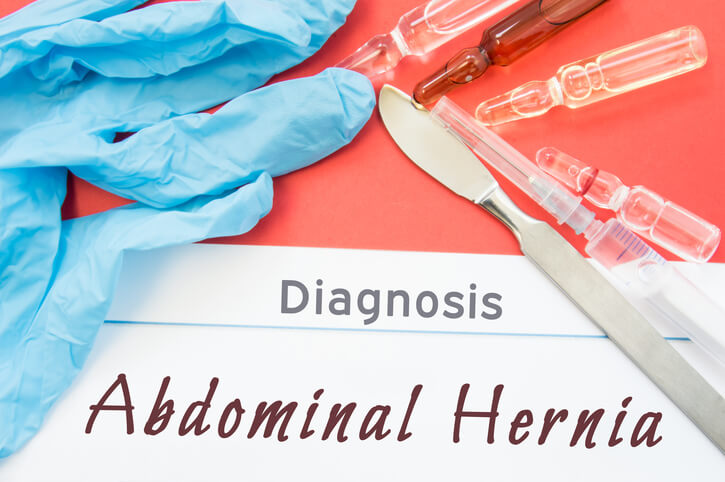Getting a hernia operation is much less invasive than it used to be, thanks to laparoscopic surgery techniques. And it’s also incredibly common, coming in second only to appendectomies for abdominal surgical procedures. After all, studies show 1.7% of us will eventually develop an abdominal wall hernia. And if you’re over 45, your odds more than double. But every hernia operation has risks, and men are 9x more likely than women to need one in their lifetime. What most people see as a one-time procedure can easily spiral into an ongoing health issue. And for most people, each new hernia recurrence and repair surgery is even more dangerous than the last.
Why Would You Need a Hernia Operation?
Hernias are fairly common, but only umbilical hernias in babies and children go away on their own without surgical intervention. The most common hernia types are:
- Inguinal (inner groin)
- Incisional/ventral (prior incision site during abdominal surgery)
- Femoral (outer groin)
- Umbilical (belly button)
- Hiatal (upper stomach)
Whenever organs, intestines or fatty tissue bulge through a weak spot in the surrounding muscle, it’s called a hernia. Hernia operation techniques can vary depending on location and size, but mesh or suture repair are the most common.
Related: Get Answers to Your Own Questions
What Complications Can Happen After Your Hernia Operation?
Commonly reported hernia operation complications include bruising, hematomas (blood that collects where the hernia was before) and surgical site infections. Scar tissue, numbing, and pain are also typical immediately after surgery. Fewer than one in five patients experience infection and bleeding afterwards, but if it happens, notify your doctor immediately.
Hernia recurrence is a serious risk — especially for patients with mesh implants. Most surgeons doing laparoscopic hernia repairs use mesh implants to strengthen weakened muscle and keep organs and tissue in place. But if you experience a hernia recurrence after your initial operation, surgery’s the only way to repair it. While revision surgery can cost thousands in medical bills and lost wages, it’s also riskier. According to The British Hernia Center, “the chances of success actually diminish with each successive attempt at repair.”
According to the U.S. Food and Drug Administration, the most serious hernia operation complications reported with mesh implants include:
- Adhesions — Scarring forms around mesh implant materials and causes internal tissue to stick together.
- Bowel obstruction — Indicates intestinal blockage, usually from tissue and/or mesh implant adhesion.
- Fistula — Abnormal connection between two different body parts, such as organs, vessels and intestines.
- Seroma — Fluid build-up beneath the skin at or near the surgical site.
- Perforation — Mesh implants can puncture holes through neighboring tissues or organs.
In addition, hernia mesh may shrink or migrate elsewhere within the body, affecting blood flow and causing chronic pain.
Do You Really Need a Hernia Operation?
If your untreated hernia symptoms are minimal or even non-existent, your doctor might suggest taking a “wait and see” approach. In the meantime, you can try a few things that may keep your hernia from growing larger or getting worse. Your doctor may suggest you lose weight, avoid lifting heavy objects, stop smoking or exercises to strengthen surrounding muscle tissue. However, these recommendations won’t spontaneously heal your hernia or help you avoid surgery indefinitely.
Keep in mind that if you refuse elective surgery now, you may need an emergency hernia operation down the road. Why? According to a December 2017 study, 45% of femoral hernia patients developed intestinal strangulation 21 months after their initial diagnosis. That means your intestines or bowel pokes through your abdominal wall, then muscles clamp down, cutting off the oxygen supply. Besides extreme pain, strangulation can cause septicemia, which can be fatal without emergency surgery. An urgent femoral hernia operation may require bowel resection and has a 10x higher mortality rate than elective surgery does. For most, “watchful waiting” is a temporary solution to a problem that only surgery can fix.
Once you’re ready to schedule surgery, ask your doctor to explain which mesh implant material may work best for you. If your hernia’s small enough, you may not need a mesh implant for successful repair. Since many different hernia mesh patch sizes, materials and tensile strengths exist, ask your doctor to explain pros and cons. Finally, your health, age, anesthesia response and other risk factors will determine which hernia operation technique is right for you.
What Patients With Defective Hernia Mesh Injuries Can Do
Hernia mesh can reduce your risk for recurrence, but some devices are safer than others. Some manufacturers issue voluntary hernia mesh recalls due to excessive adverse event reports, like Ethicon’s Physiomesh in May 2016. If you or someone you love suffered injuries from defective hernia mesh, you may qualify for a cash settlement. To see in just minutes whether you may qualify for financial compensation, complete your free claim evaluation today. Once you’ve submitted your information, an experienced advocate will call to schedule an in-person, confidential meeting to discuss compensation options.
Related: Hernia Recurrence Risks: Which Type of Mesh Implant Is Safest?
Mandy Voisin
Mandy Voisin is a freelance writer, blogger, and author of Girls of the Ocean and Star of Deliverance. As an accomplished content marketing consultant, mom of four and doctor's wife, Mandy has written hundreds of articles about dangerous drugs and medical devices, medical issues that impact disabled Americans, veterans' healthcare and workers' compensation issues since 2016.

